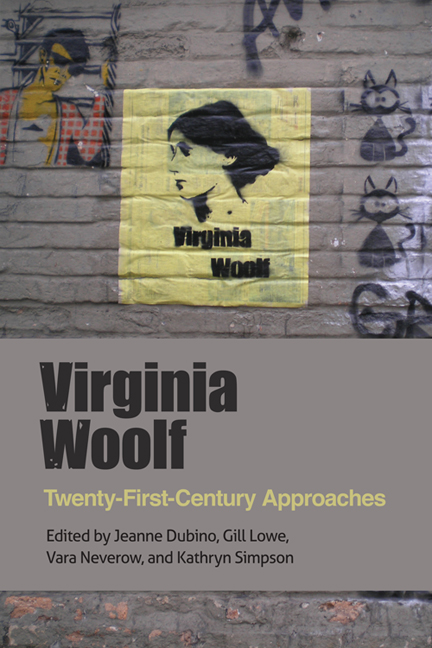Introduction
Published online by Cambridge University Press: 05 August 2016
Summary
Our vision for this project has been to bring together a collection of articles taking diverse twenty-first-century academic approaches to Woolf studies. The publication emerges from the collaborative effort of four editors: two from the UK and two from the US. Representing recent trends in scholarship about Virginia Woolf, the volume offers multiple angles of interpretation and enquiry. It examines patterns in Woolf's life and work that are unstable, multilateral or evolving; fractured but also fused; contradictory yet connected. Many of the essays examine unresolved dissonances, binaries and doubles, ruptured meanings, and oppositional factors, and focus on ambivalence, antithesis, and paradox. Each essay takes a distinctive perspective and examines unresolved or previously unexplored tensions, whether in the contexts of Woolf's own experience or in the framework of her literary, political, and intellectual work.
The essays are organised into five interconnected sections. Beginning with essays exploring the private and personal, the focus then moves outwards to consider linguistic investigations, wider cultural concerns focusing on commodification and constructions of identity, and a scrutiny of ideas of being (human or nonhuman). The collection concludes with a fresh perspective on firmly established themes in Woolf studies – gender, sexuality, and the nature of the other – offering new and illuminating lenses through which to read her work in the twentyfirst century. Woolf's own assertion in her 1924 diary entry that ‘we're splinters & mosaics; not, as they used to hold, immaculate, monolithic, consistent wholes’ (D 2: 314), fully validates our investigation of the splinters and mosaics in Woolf's life and work. As this introduction will establish, these approaches are embedded in contemporary scholarship, such as Bryony Randall and Jane Goldman's edited collection Woolf in Context (2012). Gabrielle McIntire's Modernism, Memory, and Desire: T. S. Eliot and Virginia Woolf offers the reader an intensive co-analysis of literary expression and issues of authorial identity in the chapter ‘Virginia Woolf, (Auto)biography and the Eros of Identity: Reading Orlando’. McIntire's analysis is representative of the sophisticated ways in which Woolf's personal experiences and creative expressions are currently being interpreted by scholars who cross the boundaries between the text and the author, casting aside the mantra of the intentional fallacy.
Information
- Type
- Chapter
- Information
- Virginia WoolfTwenty-First-Century Approaches, pp. 1 - 14Publisher: Edinburgh University PressPrint publication year: 2014
